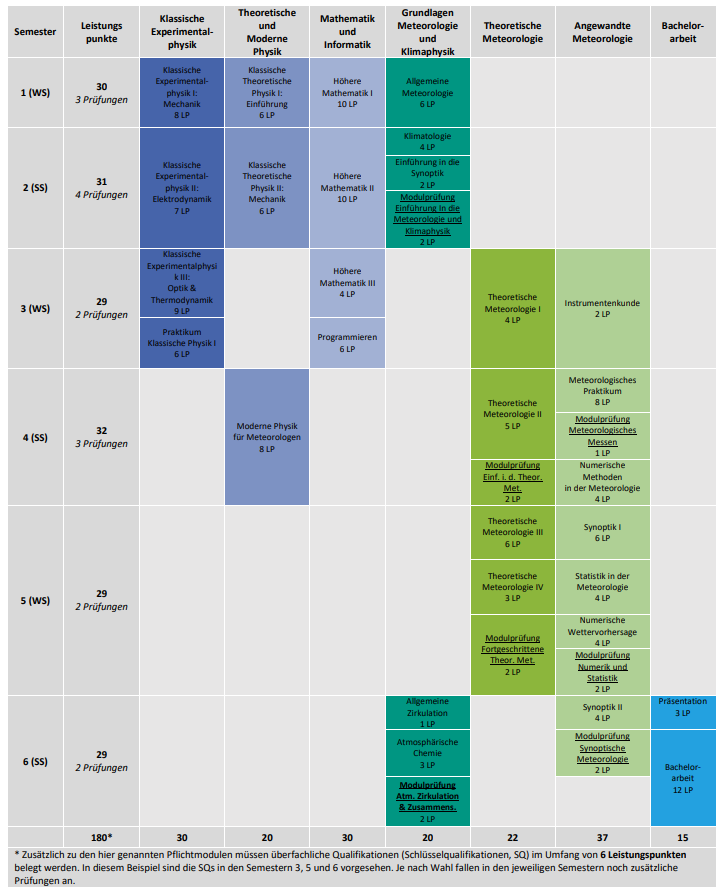Course of studies Bachelor Meteorology

Shortcuts: LP= credit point, V:lecture, Ü: exercise, S: seminar, data in semester hours per week. Study plan as PDF for download
Information on the topics of the bachelor program:
The Bachelor's programme is formally divided into 8 subjects, which in turn can be classified into 4 superordinate subject areas:
- Meteorology,
- physics,
- Mathematics and Computer Science and
- Interdisciplinary qualifications.
The subjects are again divided into modules consisting of several courses (a detailed description of the modules and courses can be found in the module handbook Bachelor Meteorology and Physics):
- Meteorology
- Basics Meteorology
The focus is on acquiring the physical fundamentals of meteorology and climatology as well as a fundamental understanding of the relevant physical and chemical processes taking place in the atmosphere, the Earth's climate system and the essential elements of weather events. - Theoretical meteorology:
Students acquire knowledge about hydro- and thermodynamic processes in the atmosphere on the basis of physical laws as well as related mathematical solutions. In addition, they learn theoretical models for the description of atmospheric phenomena and radiation processes in the atmosphere. - Applied Meteorology:
Practical and theoretical basics for the application of different meteorological measurement methods as well as the evaluation of measurement data are tested. The physical analysis, diagnosis and forecast of current weather events will be taught by means of theory and a weekly analysis and discussion of current weather. Lectures on numerical methods, which are developed in different programming languages, and statistics create the basis for working with numerical models. - Bachelor's thesis:
In the bachelor thesis, each student deals with a current research topic, independently works out results, which are compiled and presented in a scientific paper.
- Basics Meteorology
- Physics
- experimental physics:
Here students acquire knowledge of the experimental foundations and mathematical description of classical mechanics, hydromechanics, special relativity, classical electrodynamics, optics and classical thermodynamics. In the practical course, students perform physical measurements and experimental setups in the fields of optics, electrodynamics and electronics. - Theoretical and Modern Physics:
In Classical Theoretical Physics, students acquire basic mathematical knowledge and skills using the example of simple mechanical problems, the treatment of the analytical mechanics of point masses, rigid bodies and the continua at the centre. In the lecture on modern physics, students learn about the following topics: Special relativity, quantum physics, atomic physics, solid state physics and nuclear and elementary particle physics.
- experimental physics:
- Mathematics and computer science
- Higher mathematics:
Students acquire knowledge in the fields of analysis, vector analysis and linear algebra as well as function theory, differential equations and integral transformations. - Programming and computer use:
Basic knowledge of a programming language, currently C++, and the learning of independent program development are the focus of this course.
- Higher mathematics:
- Interdisciplinary qualifications (e.g. scientific writing/presentation, language courses or working techniques)
